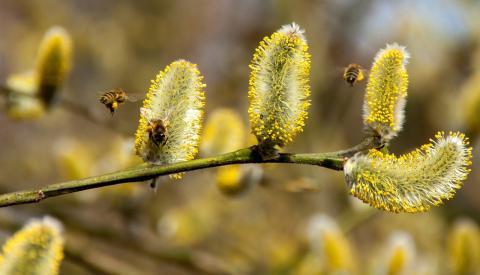
Why am I bringing up spring allergies in January??? Because now is the time to start getting ready for them! Don’t have seasonal allergies but are allergic to Fido? No problem…keep reading—this is relevant to you, too.
There are five important areas in which to work to lessen allergic responses: immune system, mucus membranes, digestion, liver, and adrenal glands. There are supportive foods, herbs, and other tips provided here for each area. Remember that before starting any herb, it’s a good idea to research it some more and make sure it “fits” you and that there aren’t any pertinent contraindications.
For some great additional ideas on working with allergies, click here, here and here! OK, here we go…
Immune System
The immune system is what responds to an allergen, whether it’s pollen in the spring air, your cat’s hair, or an egg. Chemicals produced by cells of the immune system, histamine produced by mast cells for example, are what’s responsible for the annoying symptoms that accompany allergies: runny nose; clogged sinuses; itchy, red, and/or weepy eyes, etc.
Immune System Support
- Foods – mushrooms, garlic, onions, leeks, vitamin C-rich foods (e.g., kiwi, strawberries, bell peppers, lemons, limes, grapefruit, broccoli) and zinc-rich foods (e.g., pumpkin seeds, brazil nuts, oysters, lean red meat, poultry)
- Herbs – nettle leaf (anti-inflammatory, “mast cell stabilizer” that blocks release of histamine and other chemicals from mast cells, other anti-histamine effects), chamomile (anti-inflammatory, mast cell stabilizer), elderflower/berries (decongesting, anti-inflammatory), rose hips (anti-histamine, anti-inflammatory), reishi (mast cell stabilizer, anti-inflammatory)
- Other – Avoid foods that are hard for you to digest. Partially digested food bits may trigger an inflammatory immune response in the gut that then translates to inflammation in additional sites in the body.
Mucus Membranes
The membranes lining our respiratory system are the first line of defense against airborne allergens. The mucus they produce forms a physical barrier, though it’s mucus overproduction that can make allergies so miserable. Unfortunately, many OTC allergy meds such as antihistamines wind up over drying the mucus membranes, making them less of a barrier to pollens, pet dander, and the like.
Mucus Membrane Support
- Foods – bell peppers and other colorful fruits and veggies, DHA and/or EPA forms of omega-3 fatty acids, vitamin E-rich foods (e.g., salmon, mackerel, avocados, extra virgin olive oil, eggs, spinach, sweet potatoes). For mucus membranes that are typically dry (especially for those of us who live in dry, dusty environments) apples and apricots are great.
- Herbs – edlerflowers and berries (anti-inflammatory, decongesting, improve membrane integrity), chamomile (anti-inflammatory), marshmallow or wild mallow (for dry folks), mullein leaf (anti-inflammatory, decongesting, improves membrane integrity), plantain (anti-inflammatory, improves membrane integrity)
- Other – Use a humidifier to keep membranes from being overly dry, avoid OTC antihistamines if possible, and avoid foods that result in excess mucus production (e.g., dairy, sweets).
Digestion
A strong digestive system means better food breakdown and less mucus accumulation that results from weak digestion. Also, better digestion means less inflammation stemming from partially digested food molecules in the gut.
Digestive support
- Foods – easily digested foods, during the offending season for seasonal allergies (e.g., soups, smoothies, cooked veggies, well-cooked grains/legumes (e.g., congee or kitcharee), lean forms of animal proteins rather than fattier meats (with the exception of oily, cold water fish…these are great!)
- Herbs – digestive bitter tonics like burdock root, dandelion root, angelica, or turmeric
- Other – Avoid processed foods, foods with added sugar, white flour, and pre-ground commercial flours in general. Avoid mucus-forming foods like dairy and sweets.
Liver
The liver is a key way that unwanted stuff circulating around in the bloodstream is dealt with. If the liver isn’t doing its job efficiently, this translates to a buildup of wastes and allergens in circulation. The liver also makes an enzyme that breaks down the histamine produced during an allergic response. So, a poorly functioning liver, either due to toxic overload or simply to someone’s overall make-up, will also lessen the ability of the liver to reduce histamine levels.
Liver Support
- Foods – dark leafy greens, small amounts of seaweed, lemon/lime (include some of the pulp & peel), beets, carrots, and other root vegetables
- Herbs – those that improve liver function and health like burdock root, dandelion root, nettle leaf, and turmeric
- Other – Reduce exposure to things like synthetic scents in candles, detergents, and body products; solvents; hair dye; alcohol, etc.
Adrenal Glands
The adrenals are hat-shaped glands that sit atop the kidneys. The adrenals mediate the body’s stress responses and have a role in dealing with allergens. In fact, “tired,” overworked adrenal glands that may result from chronic stress can contribute to a stuffy nose and weepy eyes while making us more susceptible to allergies via immune system effects.
Adrenal Support
- Foods – vitamin C-rich foods, mushrooms, dark leafy greens, pumpkin seeds, black beans
- Herbs – adrenal tonics like milky oat tops, reishi, eleuthero, schisandra. Calming, nervous system supporting herbs like chamomile, lemon balm, and passionflower.
- Other – Incorporate stress-reducing practices into your life. This could be something simple like stopping to take 3 deep belly breaths or more involved ideas like starting to draw, paint, sing, or meditate!
Gesundheit!








